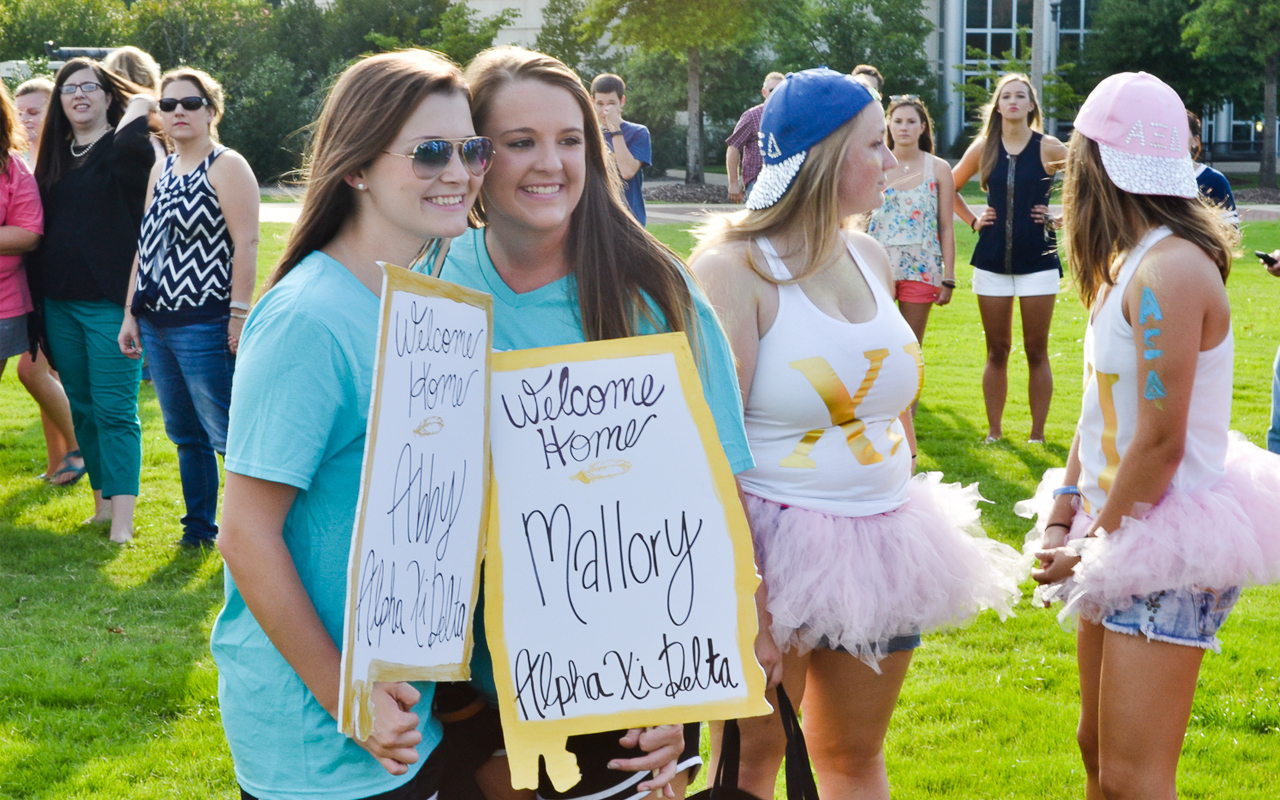
Members of Alpha Xi Delta taking photos with their new “sisters” on Bid Day on August 21. (Photo by Cooper Crippen)
Sarah Faulkner – Features Editor
features@insideuab.com
Although many may not associate UAB with booming Greek life like the University of Alabama or Auburn University, Greek life at UAB is undoubtedly growing.
According to Kristen Bowen, assistant director of fraternity and sorority life, UAB has grown from 19 to 25 Greek organizations since 2011. In 2015 alone, the UAB community welcomed two new organizations in the Sigma Kappa sorority and the Phi Gamma Delta fraternity, as well as 374 new members to its existing fraternities and sororities.
This fall, the Panhellenic Council sororities added 135 new members during fall recruitment, and recruitment for the Interfraternity Council, National Pan-Hellenic and Multicultural Greek Council began last week.
The UAB community currently has around 960 members over 4 councils, and that between fraternities and sororities, “Greeks make up around nine percent of our current undergraduate population,” Bowen said.
Konnor Kuhlmann, a member of the new fraternity Phi Gamma Delta, also called FIJI, told Kscope that his fraternity was drawn to UAB because “it’s an academically focused fraternity and UAB was deemed a place where FIJI would fit.”
“We had two awesome guys come in from HQ and walk us through the whole process,” said Kuhlmann. “We all went in to this thing not knowing each other, not knowing what to expect, or what we were getting into. It’s been incredible really. I’ve never been a part of something so big and so motivated. I’ve never had a brother before and suddenly I have 24.”
While Greek life is growing at UAB, the individual organizations are still small enough to allow its members to enjoy an intimate sisterhood and brotherhood.
“I feel like since our Greek life is a bit smaller, it’s a lot easier to get to know your sisters than it is at other schools like Alabama and Auburn, and because of that, we have a closer bond with each other,” said Naomi Bailey, a member of Delta Gamma. “You get to know more people because it’s smaller and you get to build more intimate relationships with them.”
Moreover, since UAB is popular for its medical program, many members of fraternities and sororities at UAB are given opportunities through Greek life to do volunteer work within the medical field. Being involved in a Greek organization, according to these students, cued them into these opportunities and also provided encouragement to pursue them.
“Being a member of Delta Gamma really helped me get involved with what I’m doing now,” said Bailey. “I’m now the president of ‘Best Buddies’ at UAB, an organization which helps people with intellectual and developmental disabilities create friendships with others.”
However, while UAB’s Greek life is growing in popularity for its positive aspects—opportunities for philanthropy, togetherness and scholastic encouragement being frequently cited reasons—other students feel worried about its effects on the UAB community.
Junior Daniel Latham feels that Greek life promotes a community associated with binge drinking, rape culture and racism.
“There was an article recently about that one frat with ‘daughter day care’ spray painted on their frat house,” Latham said, referencing his perception of Greek life. “I saw another one recently about an all-white racist frat at UA denying AA [African American] membership. […] Being a Computer Science major, I’m pretty much shielded from all the high school [expletive] that followed these people into higher education. I don’t think Greek life promotes healthy relationships or a safe school environment.”
Amalee Wilson, a senior, told Kscope that while she has never been in a sorority, after having gone to fraternity parties and associating with people involved in Greek life, she has found that it is a culture that encourages an attitude of exclusion of non-members through an “arbitrary selection process.”
“Although [Greek life] surely offers great networking opportunities for students, it requires a monetary investment and a great deal of commitment because students are required to participate in extracurricular events,” said Wilson. “Fraternities in particular are known for throwing large parties; the amount of binge drinking going on, and, in fact, being encouraged is obscene. Drinking is great, but binge drinking is destructive and dangerous. Many college parties include lots of drinking, however, throwing jello shots into a crowd of eager freshmen is simply irresponsible.”
For Kuhlmann, opinions like Latham’s and Wilson’s are not uncommon. With this in mind, he told Kscope that UAB’s Greek community is trying to move past the negative stereotypes associated with fraternities and sororities.
“The common idea of a fraternity or sorority as portrayed by Hollywood is toxic and no one is trying to be that,” said Kuhlmann. “We all just want to make the most of our college experience and help others to do the same.”
